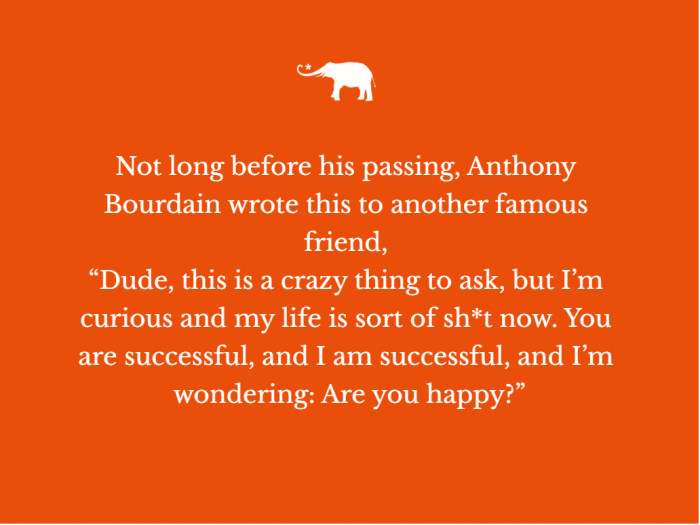My wife and I saw the #AnthonyBourdain documentary #Roadrunner last Friday. It is brilliantly done; those who followed his work will certainly enjoy it. Very honest, sometimes brutally so…like its subject. https://t.co/AxYRO3Dsb6 via @WSJ
— Carl R. Tannenbaum (@NT_CTannenbaum) July 19, 2021
Anthony Bourdain and the Career Question We Never Ask.
It’s a back-to-back meeting day—aren’t they all?—and I’m running late. Again.
I hit the meeting link and the screen quickly fills with a young face framed in chic black glasses.
I wave hello and dial the call-in number.
“The password you have entered is incorrect, please try again.”
“Ugh. Zoom is an unforgiving b*tch.” (Thank Buddha no one can hear me.)
I point to my phone and re-dial the numbers. Eventually, the chat begins.
The purpose of the call? Career mentoring. Though with all the trouble incurred getting on, it’s a wonder anyone asks me for advice.
Yet as a middle-aged woman in business, I have these calls often. And since I’ve made many career mistakes, I’m glad to help others avoid them.
Predictably the conversations begin with questions like:
How can I advance my career?
How can I get promoted?
Should I pursue a master’s degree or some designation?
I have been in this role for ___ amount of years, what’s next?
I like my job, but there’s no room for advancement. Should I leave?
All good questions. But there’s one missing—and it may be the most important of all:
What’s your definition of success?
This question is usually met with silence, quickly followed by these words:
“I never thought of that before.”
No one does.
Because we buy into the version of success we are given. Or the one we are sold.
Like a single-family house with a luxury car in the driveway. Or, an executive title and Rolex watch after decades of service. Or, maybe a vacation home at the beach and the kids graduating from top-notch schools.
That might be dandy.
But from experience, a BMW doesn’t hug you when you lose that big account or when your partner decides they like you better on the road. And who needs a Rolex when cellphones are way more reliable timekeepers? And if no one can visit us because of a global pandemic, does it really matter where we live?
We must be intentional with our careers (and lives) by defining what success means to us. Spend some time brainstorming the topic. Write about it in your journal.
Then get curious about what you’ve written. Push yourself. If making money or a promotion is in your definition, is that really what you want? Or is it a means to an end? Do you just need enough money to travel or move to a preferred location? And if part of wanting a promotion is receiving respect from peers, that’s something to earn. It doesn’t automatically come with a title.
Two other pieces of advice:
1. If you’re considering jumping to another company because the grass is greener, look at your definition of success again. Maybe it’s not the next salary bump or corner office you want—but a job where you actually see your kids during the week or can walk the dog during lunch. Where your company supports environmental or social causes (or where you can help others with their careers).
2. You don’t have to jump out of your current job to pursue your passion. You can do both. Everyday experiences are valuable inspiration for art. As an example, many famous writers and artists have maintained their day jobs while pursuing side hustles they shined in, and loved (like writing for Elephant Journal).
This was where I was going to end this piece and almost sent it to Elephant Journal’s editors, but something stopped me. It didn’t feel finished. Something was missing.
The next day my husband and I saw a movie—our first since the pandemic began. Looking over the listings, I was drawn to “Roadrunner,” the documentary about Anthony Bourdain.
Bourdain seemingly had it all. A chef turned infamous travel writer and TV star. A success by many standards. Yet he died by suicide at age 61.
Not long before his passing, he wrote this to another famous friend, “Dude, this is a crazy thing to ask, but I’m curious and my life is sort of sh*t now. You are successful, and I am successful, and I’m wondering: Are you happy?”
The quote hit home. I too spent decades on the road, in my case for a somewhat successful sales career. If I hadn’t swerved off into roles that allowed a re-balance of work and life, things could have ended differently. Unhappily.
The movie was a good reminder for me, and us, to be clear about our intentions, for a successful career and life. To do our best in both, and let the universe do the rest.
How do you define success? Write your intentions in the comment section—and see what happens.
~
 Share on bsky
Share on bsky




Read 63 comments and reply